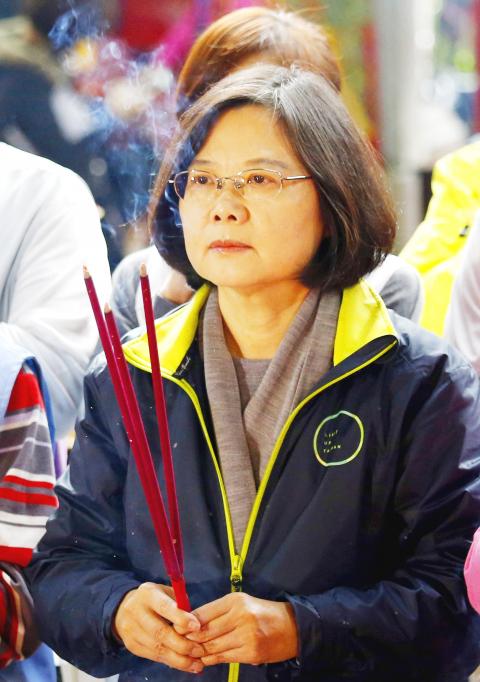Democratic Progressive Party (DPP) presidential candidate Tsai Ing-wen (蔡英文) yesterday urged the Mainland Affairs Council (MAC) to provide a detailed explanation of China’s limited transit flight proposal.
“Issues regarding cross-strait exchanges should be subjected to full-scale negotiations. I would take them in my stride if they have been through a democratic procedure and handled with equality and dignity,” Tsai said on the sidelines of a Taipei campaign event for DPP legislative candidate Rosalia Wu (吳思瑤).
If other matters were involved in the negotiations on the transit plan, the council should provide the public with a detailed account of the negotiations, she said.

Photo: Wally Santana, AP
Xinhua news agency on Tuesday carried an announcement from China’s Taiwan Affairs Office that residents of three Chinese cities — Chongqing, Kunming and Nanchang — would be allowed to transit through Taiwan Taoyuan International Airport for flights to a third nation, although a starting date was not given.
The council hailed the announcement as the result of President Ma Ying-jeou’s (馬英九) meeting with Chinese President Xi Jinping (習近平) in Singapore on Nov. 7 last year, and said it hoped the plan would be expanded to cover all Chinese travelers in the near future.
Asked whether the timing of China’s announcement was suspicious, coming so close to the presidential and legislative elections, Tsai said: “I will treat the matter with an ordinary mind.”
Cross-strait negotiations on the transit issue had been dragging, reportedly due to Beijing’s insistence that Taipei allow Chinese airlines to fly over the midline of the Taiwan Strait in return for a deal on Taoyuan transits.
Turning to the reported disappearances of five men associated with a Hong Kong-based publishing house, Mighty Current (巨流), known for books critical of the Chinese Communist Party leadership, Tsai said the Hong Kong and Chinese governments should give the public a clear explanation of what has happened to the men and adopt concrete measures to ensure freedom of speech for Hong Kong residents.
The disappearances have triggered protests in Hong Kong, as it is widely believed that the five might have been seized by Chinese law enforcement agents, as the publishing house is reportedly scheduled to release a book about a former girlfriend of Xi’s.
“This case concerns freedom of expression, which is highly valued by Taiwanese, because Taiwan went through a very difficult period to win our freedom of speech,” Tsai said.
Tsai said the nation’s history has made Taiwanese particularly concerned about whether freedom of speech is protected in other areas and countries.
Freedom of speech is a universal value, Tsai said.

DAREDEVIL: Honnold said it had always been a dream of his to climb Taipei 101, while a Netflix producer said the skyscraper was ‘a real icon of this country’ US climber Alex Honnold yesterday took on Taiwan’s tallest building, becoming the first person to scale Taipei 101 without a rope, harness or safety net. Hundreds of spectators gathered at the base of the 101-story skyscraper to watch Honnold, 40, embark on his daredevil feat, which was also broadcast live on Netflix. Dressed in a red T-shirt and yellow custom-made climbing shoes, Honnold swiftly moved up the southeast face of the glass and steel building. At one point, he stepped onto a platform midway up to wave down at fans and onlookers who were taking photos. People watching from inside

A Vietnamese migrant worker yesterday won NT$12 million (US$379,627) on a Lunar New Year scratch card in Kaohsiung as part of Taiwan Lottery Co’s (台灣彩券) “NT$12 Million Grand Fortune” (1200萬大吉利) game. The man was the first top-prize winner of the new game launched on Jan. 6 to mark the Lunar New Year. Three Vietnamese migrant workers visited a Taiwan Lottery shop on Xinyue Street in Kaohsiung’s Gangshan District (崗山), a store representative said. The player bought multiple tickets and, after winning nothing, held the final lottery ticket in one hand and rubbed the store’s statue of the Maitreya Buddha’s belly with the other,

‘NATO-PLUS’: ‘Our strategic partners in the Indo-Pacific are facing increasing aggression by the Chinese Communist Party,’ US Representative Rob Wittman said The US House of Representatives on Monday released its version of the Consolidated Appropriations Act, which includes US$1.15 billion to support security cooperation with Taiwan. The omnibus act, covering US$1.2 trillion of spending, allocates US$1 billion for the Taiwan Security Cooperation Initiative, as well as US$150 million for the replacement of defense articles and reimbursement of defense services provided to Taiwan. The fund allocations were based on the US National Defense Authorization Act for fiscal 2026 that was passed by the US Congress last month and authorized up to US$1 billion to the US Defense Security Cooperation Agency in support of the

‘COMMITTED TO DETERRENCE’: Washington would stand by its allies, but it can only help as much as countries help themselves, Raymond Greene said The US is committed to deterrence in the first island chain, but it should not bear the burden alone, as “freedom is not free,” American Institute in Taiwan Director Raymond Greene said in a speech at the Institute for National Defense and Security Research’s “Strengthening Resilience: Defense as the Engine of Development” seminar in Taipei yesterday. In the speech, titled “Investing Together and a Secure and Prosperous Future,” Greene highlighted the contributions of US President Donald Trump’s administration to Taiwan’s defense efforts, including the establishment of supply chains for drones and autonomous systems, offers of security assistance and the expansion of